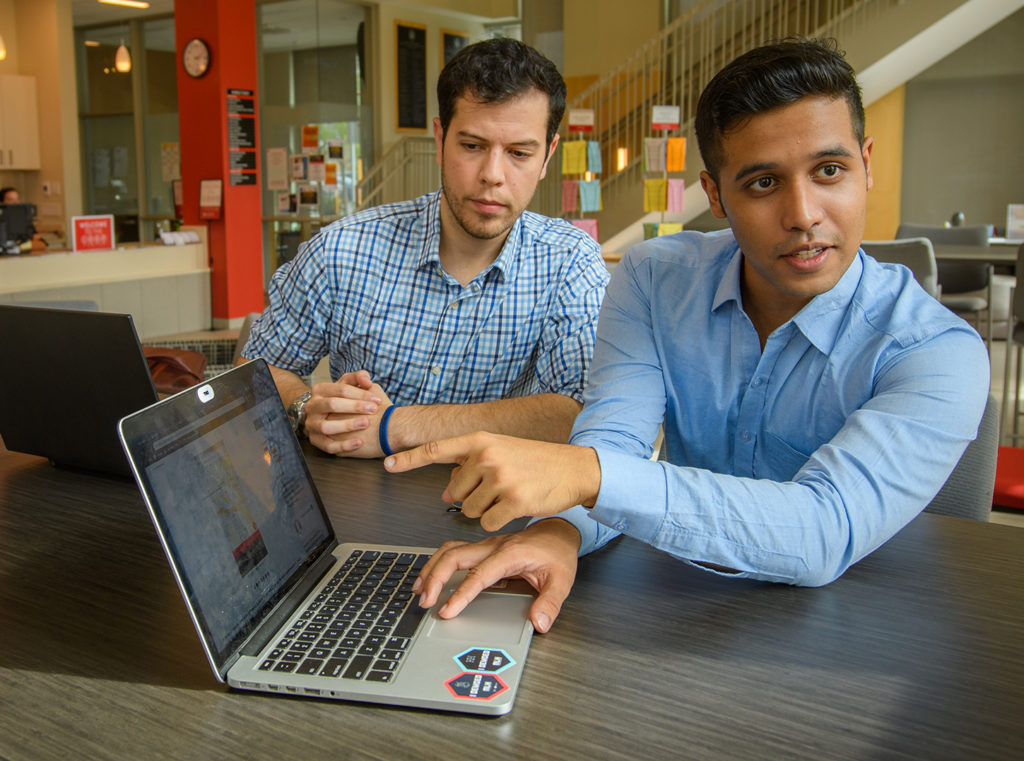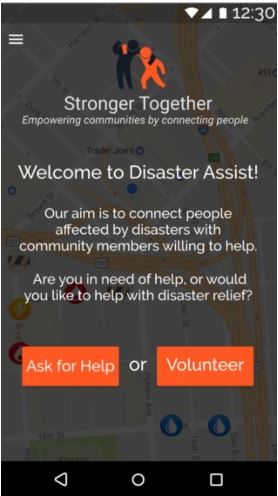Stronger Together app powers Clark students to MIT hackathon fame

Two Clark University computer science undergraduates headed a team that netted a top prize at HackMIT, the annual student-run hackathon held at the Massachusetts Institute of Technology.
Abdur Rahman Muhammad ’20 and Geva Segal ’21 were selected from a pool of more than 10,000 computer science and engineering students to put their problem-solving skills to the test. They joined over a thousand students from around the world who headed to Cambridge for the Sept. 15-16 event. Started in 2013, HackMIT includes an annual competition, professional development workshops, and networking opportunities, culminating in an intense 24-hour hackathon.
Once at the competition, Segal and Muhammad added Tufts University sophomore Yichen Wei and MIT first-year student Gabriela Goldsmith to their ranks. The team began to brainstorm, trying to pinpoint a problem to be addressed through their technology.
“The event took place as Hurricane Florence was flooding cities along the U.S. coastline. We found that in times of disaster, there is an outpouring of desire from the public to help,” says Segal, a computer science and mathematics double major from Israel. “Therefore, our team decided to develop a mobile app that aims to connect communities during disasters.”

They branded their project Stronger Together. With the app, neighbors could help neighbors by volunteering time or resources such as shelter, water, medicine, clothing, hygiene products, and more.
“The competition was 24 hours long, and we decided to stay awake through the entire event to achieve more progress with our product. The entire experience was exhausting, challenging, and mostly fun,” Segal adds.
After 24 hours, the team braced for the first round, presenting their app to judges who evaluated the students’ creativity, execution, design, and the quality of their sales pitch. The result: Segal and Muhammad’s team was ranked in the top 10, out of nearly 250 teams.
In the second round, the team had only two minutes to make a formal pitch to a team of tech company founders, executives, and professors, followed by a question-and-answer session with the judges.
“Our final stop was to pitch it at the closing ceremony event on stage in front of a crowd that included the competition participants and the judges,” Segal says.
The four won the “Exploring New Territory” category, emerging with one of the six hackathon prizes.
The competition also proved an ideal place to rub shoulders with potential employers. “Sponsors like Facebook, Google, Microsoft, IBM, and many more were around the event willing to help and to take résumés,” Segal says.
Both Segal and Muhammad, a computer science major and Presidential LEEP Scholar from New Delhi, India, attribute their success to the support of Li Han, professor and chair, and the department’s software development and coding workshops.
“In the Computer Science and Mathematics Department. we always learn how to find creative solutions to our technological problems,” Segal says. “Taking Algorithm class with Professor Li Han taught me how to tackle hard problems and to come up with efficient solutions that we tried to implement during the hackathon.”
He also recalled his experience last year in President David Angel’s First-Year Intensive class — named for the University’s motto, “Challenge Convention. Change Our World” — which encouraged students to explore creative solutions and develop projects to benefit the environment.
“A crucial part of the class is the final project, a TED Talk. In the very last class, we gave a seven- to eight-minute pitch on a project we were working on individually throughout the semester,” Segal says. “This class provided me with skills such as public speaking, creative thinking, and teamwork, which helped me a lot during the hackathon.”
Segal and Muhammad received funding from the University’s Undergraduate Student Council for their attendance at HackMIT, which featured a number of speakers, including Marten Mickos, CEO of Hackerone; Adam D’Angelo, CEO and co-founder of Quora; and Alexander Chen and Heather Luipold, creative leads at Google.
“I had a great time in the event,” Segal adds. “I formed connections with brilliant individuals and had the opportunity to work with people from the leading tech and finance companies in the world.”


